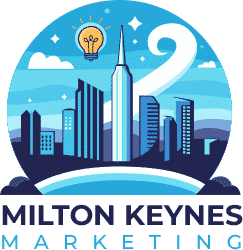PPC Campaigns for SME Growth
Local PPC specialists in Milton Keynes delivering targeted Google Ads and social campaigns, conversion-focused landing pages and measurable ROI for SMEs.
Pay Per Click Marketing for Milton Keynes Businesses UK
What PPC Marketing Is and Why It Works for Local Firms
PPC campaigns present your business to people who are actively searching for what you offer. At Milton Keynes Marketing, we tailor PPC strategies for local firms in Milton Keynes and across the UK, delivering measurable traffic and qualified leads.
PPC campaigns span Google Ads and social platforms such as Facebook and Instagram. This approach provides fast, scalable reach and allows precise control over spend and targets.
The Core Idea Behind Pay Per Click Advertising
PPC is a performance-driven model where you pay only when someone clicks your ad. This creates a direct link between spend and observable user interest.
With careful planning, PPC lets you reach specific audiences, control budgets, and measure results precisely. This aligns with a practical, accountable approach to modern marketing.
Keyword Research and Selection for High-Intent Keywords
Keyword research forms the backbone of successful PPC campaigns. It identifies the terms your prospects use and reveals intent from discovery to decision.
We use signals like search intent, historical performance, and competitive insights to build a keyword portfolio that balances volume with relevance. This helps you attract high-quality traffic at a sensible cost.
Key PPC Components: Keywords, Ads and Bids and Quality
Keywords are the signals that trigger your ads, so choosing them carefully is essential for click-through and conversions. We prioritize terms that reflect buyer intent and align with your offers.
The ad auction combines bids with Quality Score to determine visibility and cost. A strong combination of relevance and bidding enables prime placements.
Quality Score measures relevance across keywords, ads, and landing pages, influencing both position and price. A higher score typically means you gain better visibility at lower costs.
Ad Copy and Design: Crafting Ads that Drive Clicks
Great ad copy communicates value quickly and includes a clear call to action. We craft concise messages that reflect your unique selling proposition.
Strong visuals, compelling headlines, and well-structured extensions improve click-through and engagement signals for platforms like Google Ads.
Landing Page Optimisation’s Role in Conversions
The best PPC ads can underperform if the landing page fails to convert visitors into customers. We create landing pages that align with ad messages and user intent.
We prioritize fast load times, clear value props, and a simple path to conversion. This combination maximizes quality traffic and lowers bounce rates.
A Proven Landing Page Framework for Higher Conversions
Structure your pages with a strong headline, persuasive subcopy, and a single, prominent CTA. This layout focuses attention and guides users toward action.
We test forms, images, and trust signals to improve engagement and reduce friction. Each element is evaluated to lift conversion rates over time.
Ad Copy and Design: Crafting Compelling Messages
Every PPC asset should reflect your brand voice and speak directly to your target segment. We tailor messaging for Milton Keynes audiences, aligning with local searches and buying motivations.
Our process integrates keyword strategy with creative testing, ensuring ads stay relevant as markets evolve. This keeps your campaigns fresh while maintaining performance.
Ad Copy and Creative Testing: A/B for Better Performance
A/B testing helps uncover which headlines, descriptions, and visuals drive the most conversions. We run tests systematically and apply learnings across campaigns.
We adopt an iterative approach, using data-driven insights to refine ad copy, design, and placement. This continuously improves results and maximizes return on ad spend.
Best Practices for PPC Marketing
Regularly review performance and optimize based on data, not assumptions. This keeps campaigns aligned with business goals and market shifts.
Use negative keywords to exclude irrelevant traffic and improve ROAS. This protects budgets and sharpens audience focus.
Regular Testing and Optimization for PPC Success
Schedule ongoing tests for ads, landing pages, and bidding strategies. This structured approach accelerates learning and growth.
Continuously monitor budget pacing, device performance, and audience signals. This helps you maintain efficiency as trends change.
Measuring PPC Success with Metrics and ROI
Key metrics reveal whether your campaigns deliver revenue and value. Understanding these numbers helps you plan smarter and invest wisely.
We track CTR, conversion rate, cost per conversion, and ROI to inform decisions and demonstrate progress. This clarity supports long-term marketing plans.
Choosing the Right PPC Partner for Local Growth
Selecting a PPC agency requires evaluating track record, specialisation, and transparency. Look for evidence of successful outcomes and clear communication.
Milton Keynes Marketing brings Google Ads and Bing Ads expertise, with detailed reporting and a customized strategy. We focus on partnerships that align with your business goals.
Direct Call to Action: Start Your Free PPC Consultation
Ready to explore PPC with a local expert who understands Milton Keynes needs? We invite you to reach out via our contact form or by calling 07484866107.
To arrange a free digital marketing consultation, contact us now or use the dedicated form on our site. We’ll tailor a PPC plan that fits your budget and targets.
Contact our digital marketing agency for a free consultation. {
“@context”: “https://schema.org”,
“@type”: “FAQPage”,
“mainEntity”: [
{
“@type”: “Question”,
“name”: “What is PPC marketing and how does it benefit local Milton Keynes businesses?”,
“acceptedAnswer”: {
“@type”: “Answer”,
“text”: “PPC marketing is a performance-based advertising model that delivers targeted traffic and qualified leads to local businesses in Milton Keynes.”
}
},
{
“@type”: “Question”,
“name”: “Why should Milton Keynes businesses consider PPC advertising?”,
“acceptedAnswer”: {
“@type”: “Answer”,
“text”: “Because it offers fast, scalable reach with precise targeting and measurable results tailored to local audiences.”
}
},
{
“@type”: “Question”,
“name”: “How does PPC ensure a direct link between spend and user interest?”,
“acceptedAnswer”: {
“@type”: “Answer”,
“text”: “PPC is performance-driven, where you only pay when someone clicks your ad, directly showing user interest.”
}
},
{
“@type”: “Question”,
“name”: “What role does keyword research play in successful PPC campaigns?”,
“acceptedAnswer”: {
“@type”: “Answer”,
“text”: “Keyword research identifies relevant high-intent search terms that attract quality traffic and improve campaign efficiency.”
}
},
{
“@type”: “Question”,
“name”: “What are the key components of effective PPC campaigns?”,
“acceptedAnswer”: {
“@type”: “Answer”,
“text”: “The key components include relevant keywords, compelling ads, strategic bids, and quality scores for optimal visibility.”
}
},
{
“@type”: “Question”,
“name”: “How do ad copy and design impact PPC performance?”,
“acceptedAnswer”: {
“@type”: “Answer”,
“text”: “Effective ad copy and visuals quickly communicate value and encourage clicks through clear messaging and strong visuals.”
}
},
{
“@type”: “Question”,
“name”: “Why is landing page optimisation crucial for PPC success?”,
“acceptedAnswer”: {
“@type”: “Answer”,
“text”: “Optimised landing pages improve conversions by aligning with ad messages, ensuring fast load times, and guiding users to take action.”
}
},
{
“@type”: “Question”,
“name”: “What is the importance of A/B testing in PPC campaigns?”,
“acceptedAnswer”: {
“@type”: “Answer”,
“text”: “A/B testing identifies the most effective creatives and messaging, continuously improving campaign performance.”
}
},
{
“@type”: “Question”,
“name”: “What are best practices for managing a successful PPC campaign?”,
“acceptedAnswer”: {
“@type”: “Answer”,
“text”: “Regular performance reviews, optimisation, negative keywords, and ongoing testing are essential for PPC success.”
}
},
{
“@type”: “Question”,
“name”: “How can I measure the success of my PPC campaigns?”,
“acceptedAnswer”: {
“@type”: “Answer”,
“text”: “Key metrics like CTR, conversion rate, cost per conversion, and ROI help evaluate campaign effectiveness and guide decisions.”
}
}
]
}



